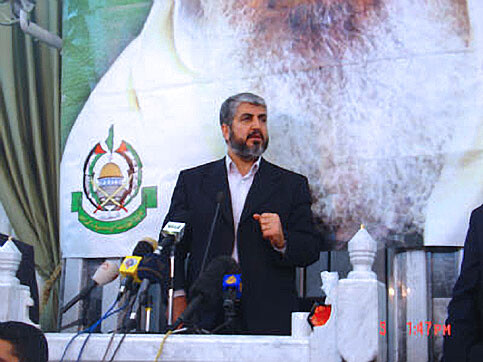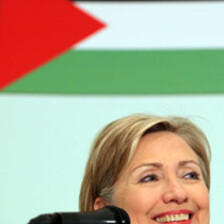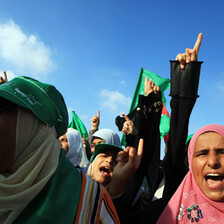The Electronic Intifada 22 February 2006

Khaled Meshal, head of the political bureau of Hamas, addresses worshippers at a mosque in Damascus, where he is exiled (PIC)
Hamas was elected on a political platform which Palestinians and those outside the country are free to accept or reject. Palestinian Authority Chairman Mahmoud Abbas, who claims that he was also democratically elected by the same Palestinians just a year ago, but on a different political programme, opposes Hamas. So does the EU, the US, Israel and others.
Winning the election is apparently not enough, and it is now demanded that Hamas adopt Fatah’s defeated and discredited approach in order to render itself acceptable to outside powers.
The pressure on Hamas to renounce violence and recognize Israel must be placed in its proper context. Hamas claims the right to resist as long as there is occupation, but so does Fatah. Abbas, who often endorses this right, simply says that the Palestinians should not exercise it. Rather, he says that Palestinians should engage in nonviolent resistance, although he has done absolutely nothing to support the valiant nonviolent struggles of Palestinians trying desperately to save their land from the insatiable jaws of Israeli bulldozers.
For more than a year, Hamas has observed a truce with Israel, while many Fatah splinter groups did not, despite Abbas’ efforts to get them to do so. The oddity is that while Hamas is neither committing violence nor threatening to resort to it, it still is blamed. While Israel, which continues to kill Palestinian civilians and carry out extrajudicial executions on a daily basis, faces no calls to end its aggression and renounce violence and colonization.
Israel now claims, as it did years ago with the PLO, that it will not negotiate with anyone who does not recognize its “right to exist”. If that is the case, why did Israel refuse for the past five years to negotiate with the Fatah-led PLO and PA — which explicitly recognized it and renounced violence and begged everyday for negotiations? The implementation of the two-state solution has not been blocked by Hamas or its violence, or its reluctance to recognize signed agreements. The main obstacle is Israel’s placement of 400,000 settlers throughout the West Bank in a manner calculated to preclude an Israeli withdrawal, and its refusal to recognize the rights of the refugees.
For years, a massive peace process industry has worked to obscure these simple facts and to place all the burden and blame on the Palestinians. Now it is threatening to punish the occupied, while the occupier is free to commit crimes and pays no cost. It is time for those who sponsored this failed approach to break with their bankrupt and counterproductive policies.
Since the election, Khaled Meshal, the leader of Hamas, stated that his organization is ready to end all armed struggle and reach an accommodation with Israel if Israel commits to full withdrawal from the territories occupied in 1967. Hamas’ willingness to reach such a compromise is a disaster for Israel, because Israel has no interest whatsoever in leaving the occupied territories. Just last week, acting Israeli Prime Minister Ehud Olmert announced his government’s intention to annex all of the Jordan Valley, in addition to all the major settlements, and no one disputes that this is what is actually happening on the ground. This is supported by a vast majority of the Israeli public.
Hamas’ willingness to accept an Israeli withdrawal only from the 1967 occupied territories is an implicit recognition of Israel. Israel’s refusal to end the occupation and its continued construction of new colonies is an act that demonstrates its total rejection in practice of any Palestinian right to statehood, no matter what the big placards say.
Hamas has not indicated that it plans to abrogate existing agreements, but stated it will respect those that serve the interests of the people it represents. Isn’t this the only responsible position a government should take? Every government has the right to review the policies of its predecessors; otherwise there would be no point in having elections and changes of government. Did not President George Bush abrogate the Kyoto Protocol on climate change and the Anti-Ballistic Missile Treaty when he came into office? He also cancelled the US signature on the treaty that created the International Criminal Court. He argued that all these agreements harmed American interests or were outdated, and he exercised his country’s sovereignty by cancelling these agreements despite overwhelming opposition from the rest of the international community.
Currently Israel and its chorus of supporters view Hamas not as part of the Palestinian political structure, but as a terrorist organisation which is alien and which can be isolated from its broad base of support. Because this is wrong, what is based on it is also wrong. Hamas has been elected to lead the Palestinian Authority which already recognizes Israel, which has an elected president who is warmly favoured by Israel and its staunch allies, and they share a legislative council composed of other Palestinian factions, including a sizeable portion of Fatah. It is not customary in international relations to demand fresh legal commitments (or recognition for that matter) from every government voted in office.
Isolating Hamas will only further radicalize the Palestinians under occupation. Israel and its apologists want the occupied to guarantee the security of the occupiers without defining the occupation as wrong and illegal and committing themselves to ending it. They want Palestinian violence to stop not to create peace but to free Israeli hands for continued anti-Palestinian violence and colonisation. And finally, they want renewed recognition when Israel does not recognize any borders and freely seizes land whenever it wants.
Which Israel should the Palestinians recognize once more? Is it the one that existed before June 4, 1967, or the one with the new illegal colonies and settlements, the one which Israeli leaders define differently every day?
Punishing Hamas for being elected and punishing the Palestinians for practising their right to democratic life is wrong, irresponsible and not conducive to peace and security. The experience of the recent past dictates that there is an opportunity to revise and reconsider many blunders. One major lesson is that peace and eradication of violence can better be served by removing injustice. That means confronting and standing up to the strong and unjust and protecting and supporting the weak and oppressed.
Maintaining deadly silence and inaction on injustice and occupation, while pampering the occupier, as the “civilised” governments in the United States and the European Union are doing, is guaranteed to lead to further bloodshed and deepen the growing rift between them and the Arab and Muslim worlds.
EI contributor Hasan Abu Nimah is the former permanent representative of Jordan at the United Nations.
Related Links





